Publications
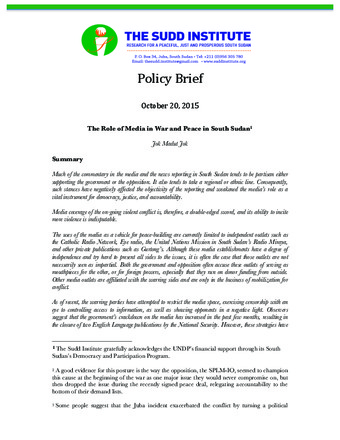
The Role of Media in War and Peace in South Sudan
Author: Jok Madut Jok
Organization: The Sudd Institute
Type: Policy Briefs
Date: 20/10/2015
Much of the commentary in the media and the news reporting in South Sudan tends to be partisan either supporting the government or the opposition. It also tends to take a regional or ethnic line. Consequently, such stances have negatively affected the objectivity of the reporting and weakened the media’s...
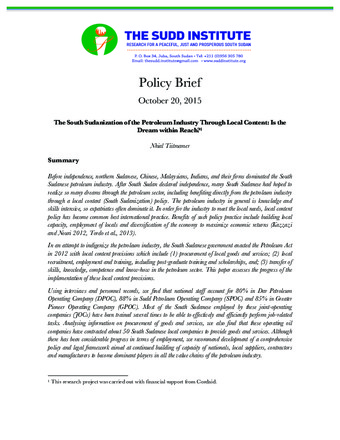
The South Sudanization of the Petroleum Industry Through Local Content: Is the Dream within Reach?
Author: Nhial Tiitmamer
Organization: The Sudd Institute
Type: Policy Briefs
Date: 20/10/2015
Before independence, northern Sudanese, Chinese, Malaysians, Indians, and their firms dominated the South Sudanese petroleum industry. After South Sudan declared independence, many South Sudanese had hoped to realize so many dreams through the petroleum sector, including benefiting directly from the petroleum industry through a local content (South Sudanization) policy.
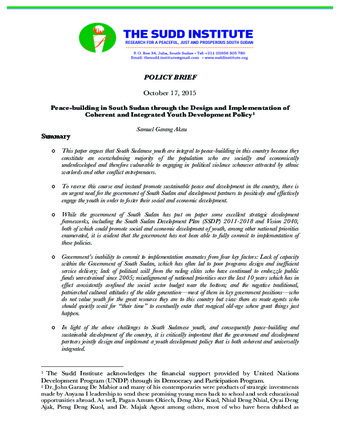
Peace-building in South Sudan through the Design and Implementation of Coherent and Integrated Youth Development Policy
Author: Samuel Garang Akau
Organization: The Sudd Institute
Type: Policy Briefs
Date: 17/10/2015
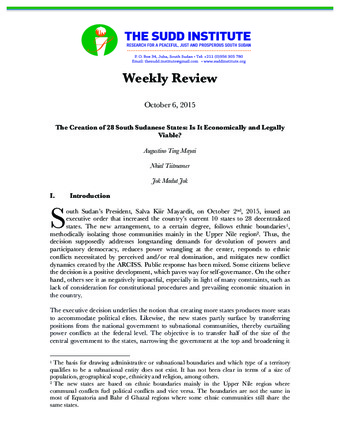
The Creation of 28 South Sudanese States: Is It Economically and Legally Viable?
Authors: Jok Madut Jok, Nhial Tiitmamer, Augustino Ting Mayai
Organization: The Sudd Institute
Type: Weekly Reviews
Date: 06/10/2015
South Sudan’s President, Salva Kiir Mayardit, on October 2nd, 2015, issued an executive order that increased the country’s current 10 states to 28 decentralized states. The new arrangement, to a certain degree, follows ethnic boundaries[1], methodically isolating those communities mainly in the Upper Nile region[2].
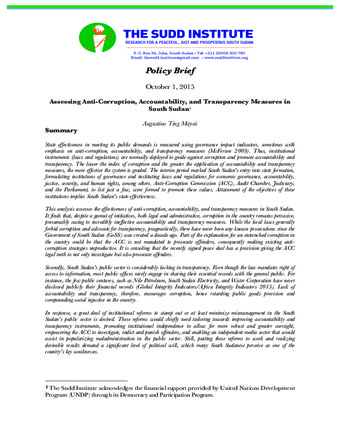
Assessing Anti-Corruption, Accountability, and Transparency Measures in South Sudan
Author: Augustino Ting Mayai
Organization: The Sudd Institute
Type: Policy Briefs
Date: 01/10/2015
State effectiveness in meeting its public demands is measured using governance impact indicators, sometimes with emphasis on anti-corruption, accountability, and transparency measures (McFerson 2009). Thus, institutional instruments (laws and regulations) are normally deployed to guide against corruption and promote accountability and transparency.
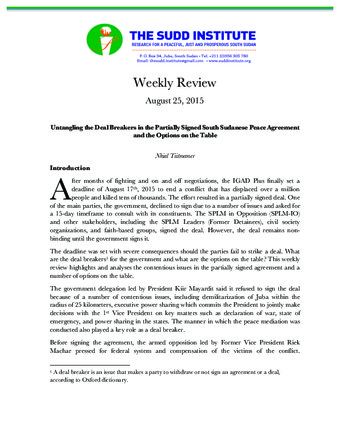
Untangling the Deal Breakers in the Partially Signed South Sudanese Peace Agreement and the Options on the Table
Author: Nhial Tiitmamer
Organization: The Sudd Institute
Type: Weekly Reviews
Date: 25/08/2015
After months of fighting and on and off negotiations, the IGAD Plus finally set a deadline of August 17th, 2015 to end a conflict that has displaced over a million people and killed tens of thousands. The effort resulted in a partially signed deal.
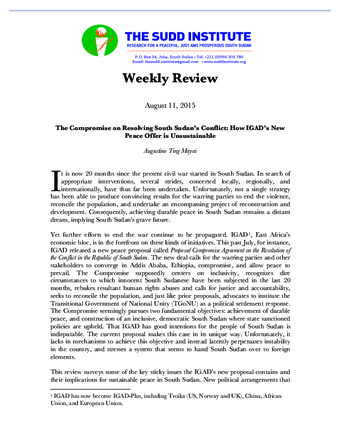
The Compromise on Resolving South Sudan’s Conflict: How IGAD’s New Peace Offer is Unsustainable
Author: Augustino Ting Mayai
Organization: The Sudd Institute
Type: Weekly Reviews
Date: 11/08/2015
It is now 20 months since the present civil war started in South Sudan. In search of appropriate interventions, several strides, concerted locally, regionally, and internationally, have thus far been undertaken. Unfortunately, not a single strategy has been able to produce convincing results for the warring parties to end the...
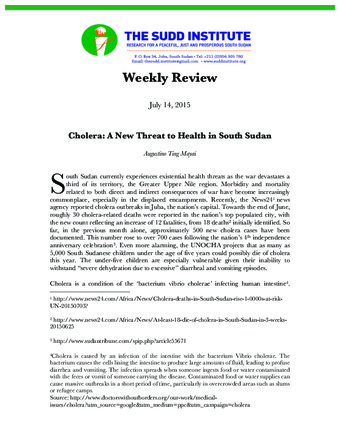
Cholera: A New Threat to Health in South Sudan
Author: Augustino Ting Mayai
Organization: The Sudd Institute
Type: Weekly Reviews
Date: 14/07/2015
South Sudan currently experiences existential health threats as the war devastates a third of its territory, the Greater Upper Nile region. Morbidity and mortality related to both direct and indirect consequences of war have become increasingly commonplace, especially in the displaced encampments.
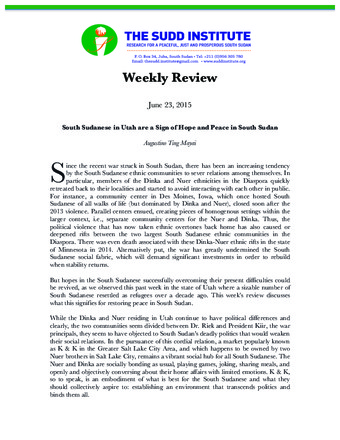
South Sudanese in Utah are a Sign of Hope and Peace in South Sudan
Author: Augustino Ting Mayai
Organization: The Sudd Institute
Type: Weekly Reviews
Date: 23/06/2015
Since the recent war struck in South Sudan, there has been an increasing tendency by the South Sudanese ethnic communities to sever relations among themselves. In particular, members of the Dinka and Nuer ethnicities in the Diaspora quickly retreated back to their localities and started to avoid interacting with each...
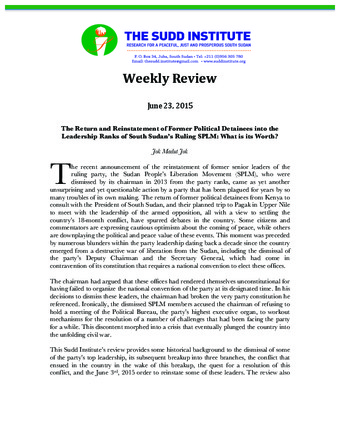
The Return and Reinstatement of Former Political Detainees into the Leadership Ranks of South Sudan’s Ruling SPLM: What is its Worth?
Author: Jok Madut Jok
Organization: The Sudd Institute
Type: Weekly Reviews
Date: 23/06/2015
The recent announcement of the reinstatement of former senior leaders of the ruling party, the Sudan People’s Liberation Movement (SPLM), who were dismissed by its chairman in 2013 from the party ranks, came as yet another unsurprising and yet questionable action by a party that has been plagued for years...
